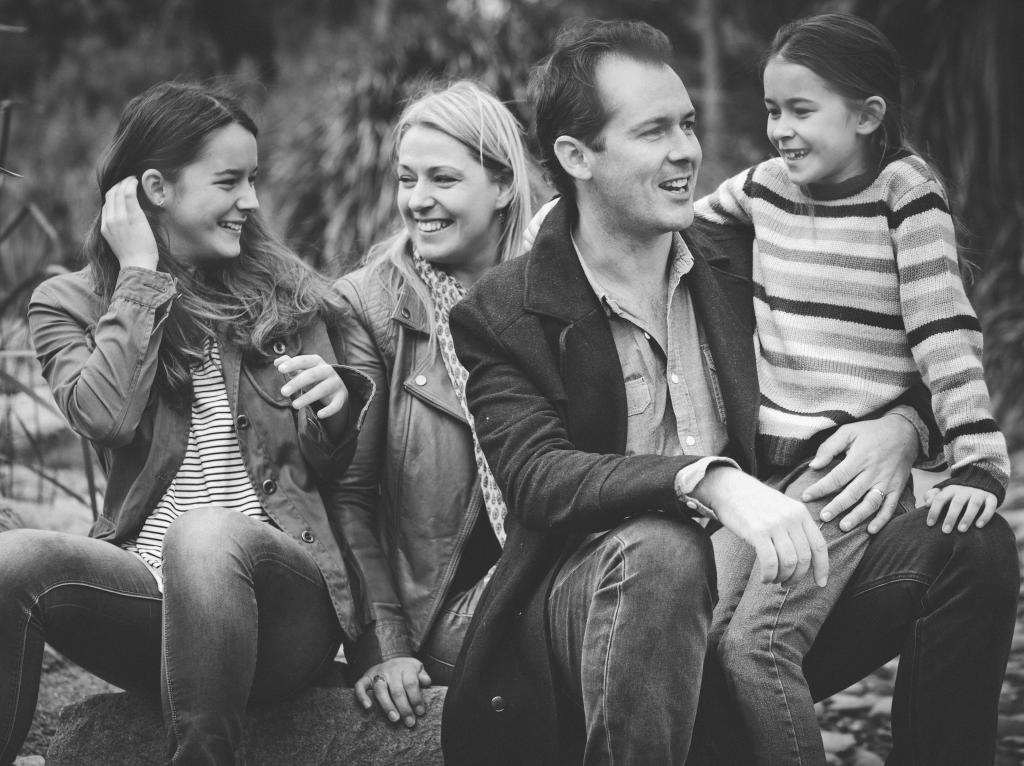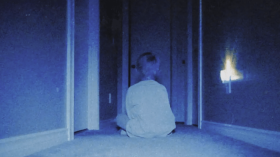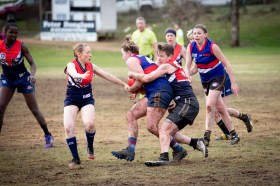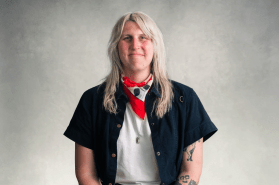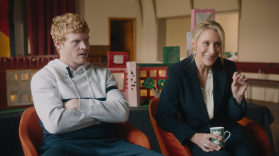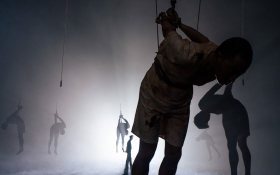Fiona Harris and family. Photo credit: Shannon Morris Photography
Writer, actor and director Fiona Harris was working on a television comedy show when her husband, performer Mike McLeish, suggested they start a family. Harris embraced the idea, contrary to the beliefs of some that maintaining a creative career and having children would be difficult.
‘Before I got pregnant basically everyone said, “Do your acting now, travel now, because once you have kids…” And we just thought, “We’re not going to do that. I refuse to let that happen,”’ she told ArtsHub.
‘Mike was the one who said, “Let’s start having kids,” and I had just started doing SkitHOUSE, the first series. I was like, “Oh my God, how? I am doing this show.” And he said, “We’ll make it work,” and he basically talked me into it, and he was right and we did make it work.’
But Harris could never have imagined how much having children would help inspire her creativity.
‘There are quite a few big projects that we’ve been working on that would never have happened if it wasn’t for our kids,’ Harris said.
One of these projects is The Drop Off, a web series created by Harris and McLeish about a group of parents who become friends while chatting in between school drop-offs, and which is currently entering its second season.
Harris said one of the secrets to juggling a creative career while having kids was to include them in everything the couple did, instead of trying to keep that part of their lives separate.
‘I think the kids and the creativity go hand in hand, they’re intertwined and I think it’s a really positive thing,’ Harris explained.
‘They’ve always been around theatres and around TV sets; when I was doing SkitHOUSE, Mike was bringing my daughter to the set and I was breastfeeding during takes. And for them it’s been very natural to be around that.
‘Our eldest daughter worked on The Drop Off, she was our runner and she loved it and our little one is the same – she was an extra on the show and helped in wardrobe; they’ve both been a very big part of everything we’ve ever done.’
The experience has also helped highlight the realities of what life in the arts industry can be like.
‘It can be hard and we’ve had those times where we’ve had no money and no work and it’s been stressful,’ Harris said. ‘I think that’s good for the kids to see as well because they understand the reality of being a creative, it’s not all glamour and money. That’s been good for us as a family.
‘I remember when our youngest was a newborn and Mike was doing Keating! The Musical and I schlepped the kids all around Australia for a few months and I was just delirious with sleep deprivation and sore boobs and the whole thing. So we’ve had times like that but the creativity has never stopped,’ she continued.
‘Basically we’re very lucky in one sense because we’ve never had those 9-to-5 jobs where we’ve had to juggle childcare, which can obviously be very hard, but in another way we’ve had lots of times where Mike has been touring and I’ve been on my own with very young babies and trying to be creative.’
Motivation, productivity and creativity
In addition to The Drop Off, Harris has also created a series of kids books, something that came about after meeting like-minded people through her children’s school community.
‘Super Moopers came about because I met a mum at school who runs Story Box Library which is an online digital storytelling resource, and I started working with her and directing the storytellers,’ Harris said. ‘Through them I was introduced to Sally Rippin [author and illustrator] and I told her about my idea for a kid’s book series.’
If anything, having children has ramped up Harris’s creativity, not slowed her down.
‘We’ve both been way more proactive and creative since having kids,’ she said. ‘You want these little people to have food and a roof over their heads. So when you’re both in an industry that is very unstable and insecure, you have to look around and think, “How do we keep money coming in?” So you’re kind of forced to think of new ways of being creative.’
This motivation also drives productivity, said Harris, particularly when time is much more scarce.
‘When you’re writing in particular, you have maybe two hours while the kids are having a sleep at kinder. You just use those two hours, and every second is precious. It’s much easier to procrastinate when you don’t have kids; it was for me anyway.
‘You just become a lot more alert to your surroundings. You have such short windows of time when you can be creative, that when you do have that time you have to use it, so you’re forced to sit down and work.’
To those who said a creative life with children would be difficult, Harris had this to say: ‘I think if you’re a creative person and there’s something that you’re really passionate about, you can’t let that negativity get to you, you have to ignore it and forge ahead.
‘To friends of ours who are in the industry who really want to have kids but are scared, we say, “Don’t be, it’s totally in your control”. Of course it’s going to be hard and it’s a juggle and it’s never going to be the same, but it doesn’t necessarily have to be negative. I would just say, “Don’t listen to the the naysayers.”’
Season two of The Drop Off is out now. Learn more at www.facebook.com/thedropoffshow.
